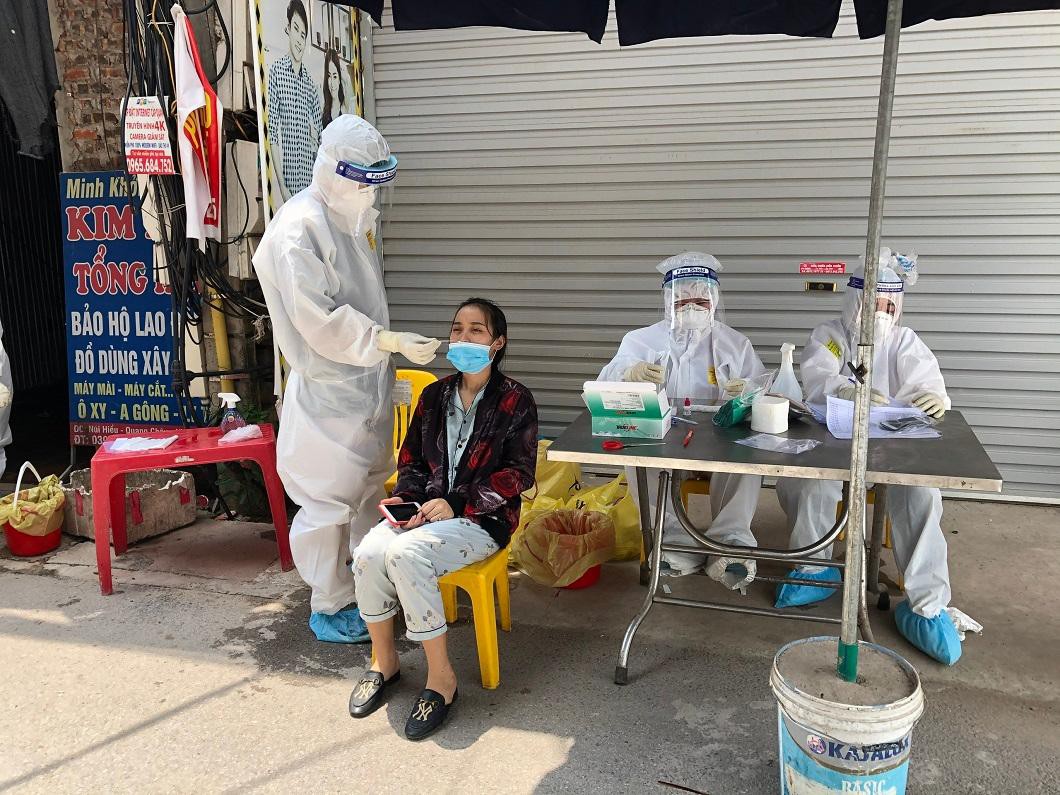(13th Congress) - Acting Director of the Far Eastern Institute of the Russian Academy of Sciences Prof. Dr. Aleksey Maslov said that the ability to develop a long-term strategy is the key to the success of the Vietnamese economy despite the difficulties caused by the global COVID-19 pandemic.
Referring to Vietnam's economic situation, Prof. Dr. Aleksey Maslov said that Vietnam has achieved impressive success in 2020, with an economic growth rate of 2.91%. In particular, Vietnam is also a model for an effective response to the COVID-19 pandemic. Professor Aleksey Maslov emphasized that although the size of the economy is not too large, Vietnam has grown continuously in recent years at a fast pace, at 6.81% in 2017, 7.08% in 2018, and 7.02% in 2019.

Medical workers take samples for COVID-19 tests in residential areas in Bac Giang Province. (Photo: TPO)
Even in 2020, with many difficulties and challenges, production of livestock products and shrimp farming increased. This is one of Vietnam's most important exports. Many other fields also achieved growth, such as agriculture increasing by 2.55%, forestry increasing by 2.82% and fishery by 3.08%.
Prof. Aleksey Maslov said that the most important area is foreign trade, which has grown despite all the negative trends of the world. Accordingly, the trade surplus reached an all-time high of USD19.1 billion. Vietnam has maintained a trade surplus for 5 consecutive years.
The Russian expert assessed that the signing of free trade agreements, especially the Vietnam - European Union Free Trade Agreement (EVFTA), has brought positive results. In 2020, Vietnam's exports to the EU reached USD34.8 billion. Professor Aleksey Maslov concluded that it should not blame everything on the pandemic. “Perhaps the main problem is in the ability to build a long-term strategy and make friends with the investing countries,” he said.
Regarding economic issues, Prof. Dr. Ruslan Kotiuk of Saint Petersburg National University, has an article affirming that "Doi Moi" (renewal) is the foundation of success in Vietnam.
With the title "Secrets of the miracle of Vietnam", Prof. Ruslan Kotiuk said that Vietnam's successful lessons have its foundation from the process of "Doi Moi" in the country since the mid-1980s, with one of its most remarkable achievements being that the number of poor people has decreased to the lowest level ever, even while the average life expectancy of the whole country has increased significantly to 75.5 years.
He emphasized that Vietnam's economy opens up to the world more and more positively every year. Dynamic growth of foreign trade, effective monetary policy, and proactive fiscal consolidation, combined with the continuous expansion of domestic consumption, contribute to the Government's success in macroeconomic management.
He highly appreciated that the Vietnamese Government paid serious attention to social projects, such as the fight against unemployment. Specific programs are underway for people in hard-to-reach and border areas, as well as ethnic minorities. These projects focus on building modern infrastructure in rural areas, irrigation systems, supplying clean water for people's daily life, and building hospitals.
According to Prof. Ruslan Kotiuk, Vietnam's strategy to fight the COVID-19 pandemic was quite effective in 2020, and it is continuing to be learned and promoted this year.
In addition to responding to new COVID-19 waves, the Vietnamese Government actively develops vaccines in the country, and actively buys finished vaccines from many pharmaceutical companies in the world, including Russia's Sputnik-V.
Russian experts believe that with the determination and drastic actions of the Vietnamese Government, the goal of having at least 150 million doses of vaccine by the end of this year is completely feasible.
Noting that the new wave of the COVID-19 pandemic may have a negative impact on society, the Russian scholar expressed his belief that the Vietnamese Government will respond flexibly to the situation, helping the Vietnamese economy continue its upward momentum of growth in 2021./.
Compiled by BTA